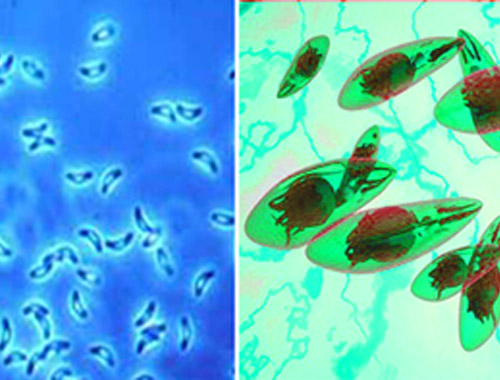Toxoplasma gondii

Published: 18 Jun 2025
ICD9: 130.9 ICD10: B58.9 ICD11: XN896
*Toxoplasma gondii* is a single-celled parasitic protozoan that can infect virtually all warm-blooded animals, including humans.
It's the causative agent of toxoplasmosis.
Here's a breakdown of key aspects:
![]() Nature: *T. gondii* is an obligate intracellular parasite, meaning it must live inside a host cell to survive and reproduce.
Nature: *T. gondii* is an obligate intracellular parasite, meaning it must live inside a host cell to survive and reproduce.
![]() Life Cycle:
Life Cycle:![]()

![]() Definitive Host: Cats (domestic and wild) are the definitive hosts. This is where the parasite undergoes sexual reproduction, producing oocysts which are shed in the cat's feces.
Definitive Host: Cats (domestic and wild) are the definitive hosts. This is where the parasite undergoes sexual reproduction, producing oocysts which are shed in the cat's feces.![]()

![]() Intermediate Hosts: Humans and other warm-blooded animals are intermediate hosts. Infection occurs through ingestion of oocysts (e.g., contaminated food, water, soil) or tissue cysts (e.g., undercooked meat).
Intermediate Hosts: Humans and other warm-blooded animals are intermediate hosts. Infection occurs through ingestion of oocysts (e.g., contaminated food, water, soil) or tissue cysts (e.g., undercooked meat).![]()

![]() Infection: Once ingested, the parasite transforms into tachyzoites (rapidly multiplying forms) and spreads throughout the body. Eventually, the immune system controls the infection, and the tachyzoites convert into bradyzoites, forming tissue cysts primarily in the brain and muscle. These cysts can remain dormant for the lifetime of the host.
Infection: Once ingested, the parasite transforms into tachyzoites (rapidly multiplying forms) and spreads throughout the body. Eventually, the immune system controls the infection, and the tachyzoites convert into bradyzoites, forming tissue cysts primarily in the brain and muscle. These cysts can remain dormant for the lifetime of the host.
![]() Transmission:
Transmission:![]()

![]() Ingestion of oocysts:
Ingestion of oocysts:![]()

![]() Contact with cat feces (e.g., cleaning litter boxes, gardening).
Contact with cat feces (e.g., cleaning litter boxes, gardening).![]()

![]() Contaminated food or water.
Contaminated food or water.![]()

![]() Unwashed fruits and vegetables grown in contaminated soil.
Unwashed fruits and vegetables grown in contaminated soil.![]()

![]() Ingestion of tissue cysts:
Ingestion of tissue cysts:![]()

![]() Eating undercooked meat (especially pork, lamb, and venison).
Eating undercooked meat (especially pork, lamb, and venison).![]()

![]() Mother-to-child transmission (congenital toxoplasmosis): If a woman is newly infected with *Toxoplasma* during pregnancy, the parasite can cross the placenta and infect the fetus.
Mother-to-child transmission (congenital toxoplasmosis): If a woman is newly infected with *Toxoplasma* during pregnancy, the parasite can cross the placenta and infect the fetus.![]()

![]() Rarely: Organ transplantation or blood transfusion.
Rarely: Organ transplantation or blood transfusion.
![]() Symptoms:
Symptoms:![]()

![]() Healthy individuals: Most infected individuals are asymptomatic or experience mild, flu-like symptoms (e.g., swollen lymph nodes, fatigue, muscle aches).
Healthy individuals: Most infected individuals are asymptomatic or experience mild, flu-like symptoms (e.g., swollen lymph nodes, fatigue, muscle aches).![]()

![]() Pregnant women: Infection during pregnancy can lead to severe consequences for the fetus, including:
Pregnant women: Infection during pregnancy can lead to severe consequences for the fetus, including:![]()

![]() Miscarriage or stillbirth
Miscarriage or stillbirth![]()

![]() Eye damage (e.g., retinochoroiditis)
Eye damage (e.g., retinochoroiditis)![]()

![]() Brain damage (e.g., hydrocephalus, mental retardation)
Brain damage (e.g., hydrocephalus, mental retardation)![]()

![]() Immunocompromised individuals: In individuals with weakened immune systems (e.g., HIV/AIDS, organ transplant recipients), toxoplasmosis can cause serious complications, including:
Immunocompromised individuals: In individuals with weakened immune systems (e.g., HIV/AIDS, organ transplant recipients), toxoplasmosis can cause serious complications, including:![]()

![]() Encephalitis (inflammation of the brain)
Encephalitis (inflammation of the brain)![]()

![]() Pneumonitis (inflammation of the lungs)
Pneumonitis (inflammation of the lungs)![]()

![]() Eye damage
Eye damage
![]() Diagnosis:
Diagnosis:![]()

![]() Blood tests to detect antibodies against *Toxoplasma gondii*.
Blood tests to detect antibodies against *Toxoplasma gondii*.![]()

![]() In some cases, tissue biopsy or imaging studies may be used.
In some cases, tissue biopsy or imaging studies may be used.
![]() Treatment:
Treatment:![]()

![]() Treatment is typically not necessary for healthy individuals with no symptoms.
Treatment is typically not necessary for healthy individuals with no symptoms.![]()

![]() Pregnant women and immunocompromised individuals are usually treated with medications to kill the parasite.
Pregnant women and immunocompromised individuals are usually treated with medications to kill the parasite.
![]() Prevention:
Prevention:![]()

![]() Cook meat thoroughly.
Cook meat thoroughly.![]()

![]() Wash fruits and vegetables thoroughly.
Wash fruits and vegetables thoroughly.![]()

![]() Wear gloves when gardening and wash hands afterward.
Wear gloves when gardening and wash hands afterward.![]()

![]() Avoid contact with cat feces, especially during pregnancy.
Avoid contact with cat feces, especially during pregnancy.![]()

![]() Change cat litter boxes daily (as oocysts take 1-5 days to become infective).
Change cat litter boxes daily (as oocysts take 1-5 days to become infective).![]()

![]() Keep cats indoors and feed them commercially prepared food to prevent them from hunting and becoming infected.
Keep cats indoors and feed them commercially prepared food to prevent them from hunting and becoming infected.![]()

![]() Pregnant women should be tested for *Toxoplasma* antibodies.
Pregnant women should be tested for *Toxoplasma* antibodies.
![]() Toxoplasma gondii* is a common parasite, and most people are exposed to it at some point in their lives. While it often causes no noticeable symptoms, it can be a serious threat to pregnant women and individuals with weakened immune systems. Awareness of the transmission routes and preventive measures are crucial for reducing the risk of infection.
Toxoplasma gondii* is a common parasite, and most people are exposed to it at some point in their lives. While it often causes no noticeable symptoms, it can be a serious threat to pregnant women and individuals with weakened immune systems. Awareness of the transmission routes and preventive measures are crucial for reducing the risk of infection.